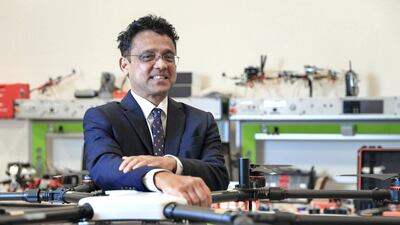Professor Lakmal Seneviratne remembers the time when pocket calculators were cutting edge. But as a teenager in Sri Lanka during the 1970s, he still used the far more primitive slide-rule, such was the cost of the new technology.
Almost half a century later, both science and Prof Seneviratne, 60, have come a long way. The professor is director of Khalifa University's Centre for Robotics and Autonomous Systems, leading a team of researchers working on innovations that could potentially save thousands of lives.
His projects include developing self-driving cars, building drones to fight fires in high-rises and systems designed to prevent industrial accidents.
“If you make the working environment simple, or controlled, like a factory or a car plant or operating theatre, then robots can do magic,” he said.
“But if you want a robot to make coffee at home, then that’s a tough one. It’s about coping with uncertainty.
“What’s changed in close to 30 years of working in robotics is computers have got cheaper.
“You can have a huge amount of computing power. But many of the fundamental problems are still the same.”
Prof Seneviratne spent his school years at St Thomas’ College in Mount Lavinia, a suburb of Colombo.
At the age of 18, professor's father abruptly announced that the children, he and two younger siblings ages 15 and 16, would be moving to London without their parents.
In 1977, Prof Seneviratne found himself as head of the household in a city almost 9,000km from home.
Looking back, he described his early years in the UK as a "baptism by fire", but that he has many fond memories.
“Being in London at that time with the freedom it brings was a great adventure,” he said. “I remember glorious summers and cricket. At that age, everything was fantastic.”
A year later, he enrolled in King's College London to study mechanical engineering.
After earning a first class degree, Prof Seneviratne went on to get a PhD in dynamics and control, moving into robotics at a time when computing power was becoming more mainstream.
He worked briefly at University College London before moving to Leicester, where he used computers to analyse the stability of North Sea platforms and nuclear power stations during a UK energy boom.
In 1987, he was offered a job at his alma mater by a former lecturer at King's College.
Once there, he set up his own laboratory and worked on how robots could be better used in manufacturing.
Over time, he became professor of mechatronics, founding director of the Centre for Robotics Research and head of the Division of Engineering.
With a prominent role at one of the world's leading universities, many would have considered themselves set for life. But when head hunters approached him in 2010 with an opportunity to set up a lab in the UAE, at Khalifa University, Prof Seneviratne was intrigued.
“At the time it was a very tough decision and I pondered it a lot,” said the father of two daughters, who are in their 20s and both work in the UK civil service.
“I knew very little about the region, I had to get a map to find where the UAE was.
“But working in a new university did appeal to me. Building a new lab in a new environment did appeal to me. When I put everything together it was a once in a lifetime opportunity,” he said.
Initially, Prof Seneviratne took up the new role during a sabbatical, juggling between the London and Abu Dhabi jobs.
In 2014, he decided to commit to the role in the UAE permanently.
Five years on, and he has no regrets. He leads a team of 50 and the university is building the department its own high-tech swimming pool to allow tidal conditions to be simulated to help develop aquatic robots.
The university also hosts the Mohamed bin Zayed International Robotics Challenge, which attracts interest from across the world and is backed with a prize money of $5 million (Dh18.4m).
Prof Seneviratne's service in the Emirates was recently acknowledged by the Government when he was awarded one of the first newly introduced 10-year visas, alongside 19 other academics.
He remains excited about the potential of robotics, but said its application in real-world settings remains a difficult problem to solve.
While some predict that self-driving cars will be on the roads within a few years, Professor Seneviratne is more cautious.
The day when fully autonomous vehicles will share roads freely with human drivers, he said, remains “far away”.
“It all comes back to the ability to deal with uncertainty,” he said. “You have heat, you have fog, you have dust. Other drivers’ behaviours are different.”
A solution may be using self-driving cars in a controlled environment, such as a university campus or airports, where pedestrians are banned from certain areas.
But he also believes there is a need for a debate for the level of risk humans are prepared to accept.
“Around 1.3 million people die every year due to accidents on roads,” he said. “That’s a startling number.
“Having said that, if they’re not drunk or drugged or drowsy, humans are generally very good drivers. So if you use a good human driver as your benchmark, you need a very high safety margin."
Professor Seneviratne said: “The potential of robotics was always there.
“But the problems of robotics are very hard. I’m pleasantly surprised, as a community, at how successful we’ve been in things like perception, language recognition. The progress is outstanding.
“Ten years ago drones were nowhere and there were no robots in hospitals. All of this progress is amazing, but when Bill Gates spoke about a robot in every home, that challenge is still big.”

